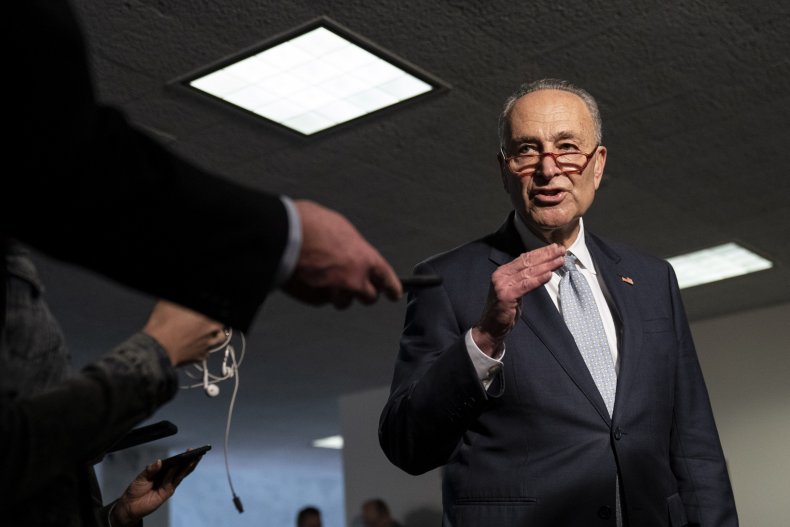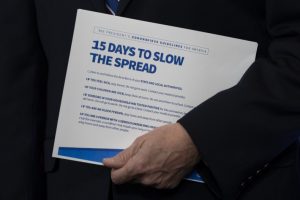As Congress and the Trump administration race to hammer out an agreement on a massive stimulus package to boost the economy in the wake of economic downturn from the novel coronavirus pandemic, Democrats have been given a seat at the negotiating table to lay out their desired changes.
Among them is the push for President Donald Trump to declare a Marshall Plan for medical facilities across the country to provide equipment and aid; stipulations for any large corporations who receive loans from the government; cancel all student loan debt—not suspend, as Trump did on Friday; and expand unemployment insurance and paid sick and family leave.
“There is nothing in [Senate Majority Leader Mitch McConnell’s] bill to help hospitals. Now, we’re told we may do it in a supplemental later. Later is no good,” Senate Minority Leader Chuck Schumer (D-N.Y.) said on the floor. “We need a Marshall Plan for hospitals right now, and we need local governments that are also on the front lines to get dollars in their pockets. Many of them will go broke.”
The Marshall Plan, first enacted in the aftermath of WWII in 1948, helped rebuild Western Europe and approved billions in U.S. federal funds to be used.
The more than $1 trillion stimulus has been outlined in 247 pages by Senate Republicans, who consulted with White House officials to construct it. Under that plan, which will be changed as talks continue to play out on Friday, many Americans would receive a $1,200 tax rebate check. What McConnell has described as the main “pillars,” it also includes $300 billion in loans for small businesses (with the opportunity for a portion of them to be forgiven), $200 billion in loans and loan guarantees for travel industry companies (like airlines, cruises and hotels) and more money for the health care industry.
Now, the measure must be negotiated among White House officials and congressional leaders from both parties.
McConnell wants to have a “shell” agreement among the chamber’s Democrats and Republicans by late Friday so staff over the weekend can draft the text and be ready for a final vote on Monday. Along the way, the Trump administration will also weigh in.
“Laid-off workers cannot wait. Struggling Main Street businesses cannot wait. Our hospitals and health centers cannot wait,” the Kentucky Republican said on the floor. “I hope these member-level discussions will be able to produce agreements in principle on all four components by the end of the day today. In fact, they must reach [an] agreement by the end of the day today.”
In addition to declaring a Marshall Plan for medical facilities, Schumer urged Trump in a phone call Friday to invoke the wartime Defense Production Act to force private companies to produce ventilators and other medical equipment. The president then delivered the order to staff members.
“POTUS told Schumer he would, and then POTUS yelled to someone in his office to do it now,” Schumer’s office said.
In the stimulus, Schumer also wants to: prohibit companies that receive federal money from buying back their own stock, laying off workers, increasing executive pay and cutting worker salaries; expand unemployment insurance; expand paid sick and family leave—beyond what a separate stimulus package did earlier this week; and cancel—not suspend—all student loan debt for the duration of the ongoing public health crisis.
According to Schumer’s spokesperson, Trump was supportive of prohibiting stock buybacks and would look into expanding unemployment insurance, paid sick and family leave, and canceling student loan debt.
The stimulus package would mark the third such one since the coronavirus pandemic has grinded global economic activity to a halt and has shut down entire sectors of the American economy. The first included more funding for medical research and treatment of the virus while the second gave some workers paid sick and family leave and gave companies tax credits to offset the cost, boosted food aid and expanded Medicaid.
“The only way the economy could come back quickly is that if there’s an economy,” said Sen. Marco Rubio (R-Fla.). “And if you don’t have these small small and midsized businesses existing in a couple of weeks, it’s gonna be really hard to bring back an economy that doesn’t exist anymore.”
This is a developing story and will be updated with additional information as it becomes available.



















